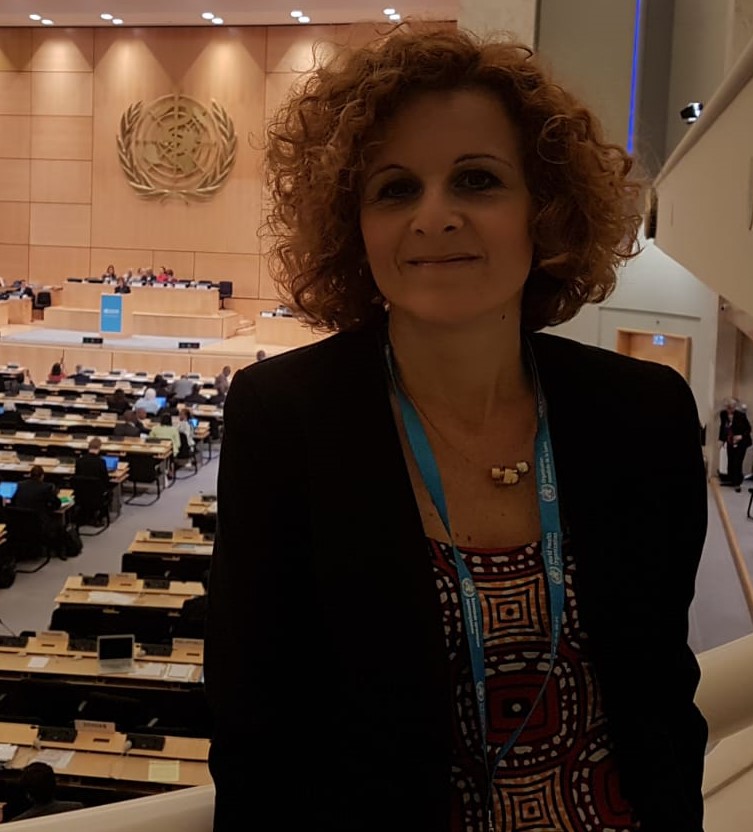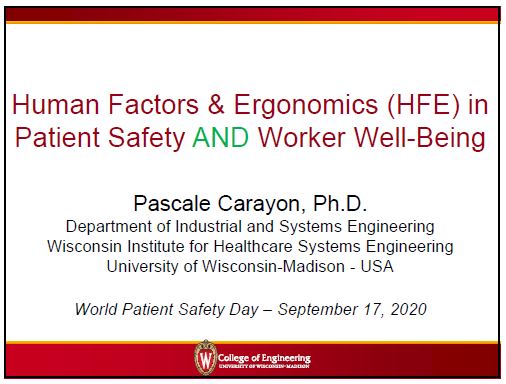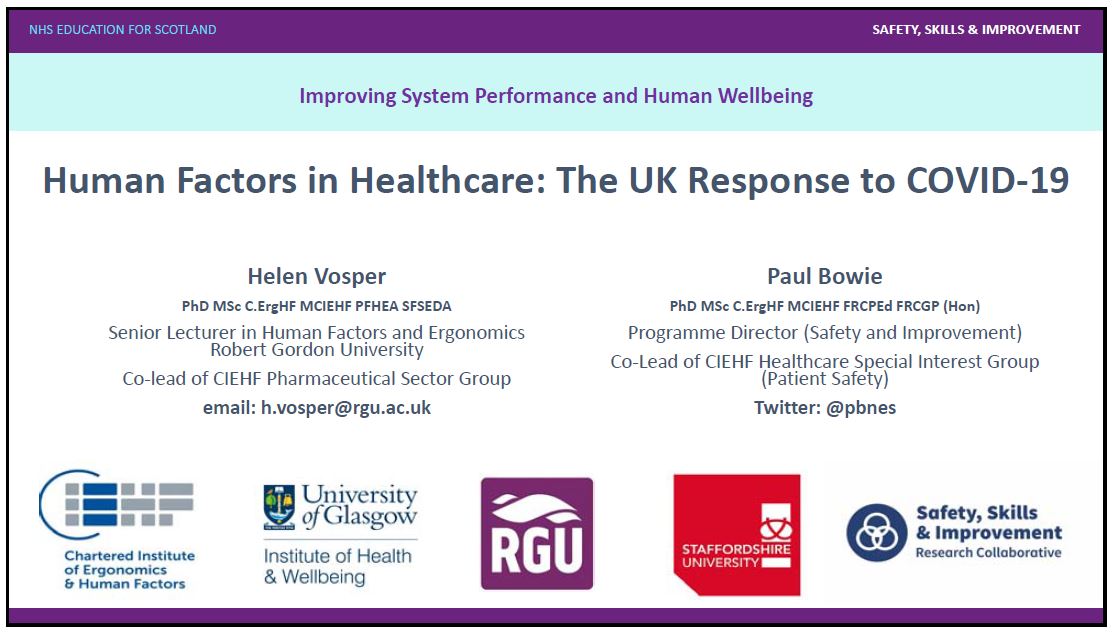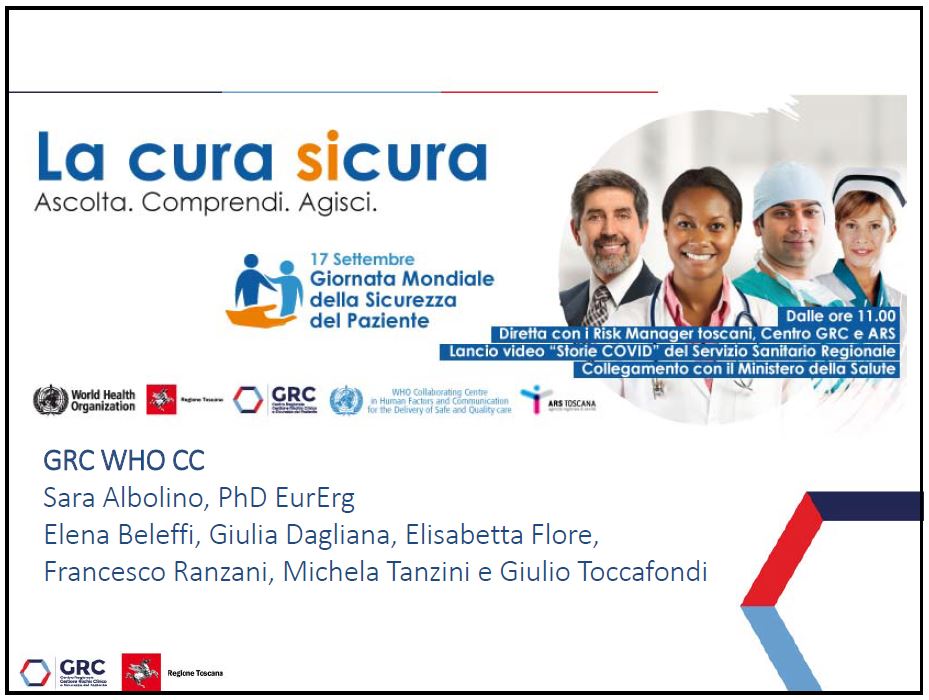Three of the leading world experts on Human Factors, Pascale Carayon, Sara Albolino and Helen Vosper shared the importance of Human Factors to improve safety for healthcare professional and patients.
This session was moderated by Eric de Roodenbeke, CEO of the International Hospital Federation (IHF).
Presentation Slides
Recording
Presenters:
 Pascale Carayon PhD, is the Leon and Elizabeth Janssen Professor in Engineering, Director of the Center for Quality and Productivity Improvement, Founding Director of the Wisconsin Institute for Healthcare Systems. Engineering and leader of the interdisciplinary Systems Engineering Initiative for Patient Safety (SEIPS) at the University of Wisconsin-Madison, USA. She received her Engineer diploma from the Ecole Centrale de Paris, France, and her PhD in Industrial Engineering from the University of Wisconsin-Madison.
Pascale Carayon PhD, is the Leon and Elizabeth Janssen Professor in Engineering, Director of the Center for Quality and Productivity Improvement, Founding Director of the Wisconsin Institute for Healthcare Systems. Engineering and leader of the interdisciplinary Systems Engineering Initiative for Patient Safety (SEIPS) at the University of Wisconsin-Madison, USA. She received her Engineer diploma from the Ecole Centrale de Paris, France, and her PhD in Industrial Engineering from the University of Wisconsin-Madison.
In the last 20 years, her research has focused on patient safety and healthcare issues such as design of health information technologies. As an industrial and systems engineer, she is renowned for her groundbreaking contributions in modeling complex system interactions in healthcare processes that influence patient safety and other outcomes for patients and healthcare professionals.
She is a Fellow of the Human Factors and Ergonomics Society and Fellow of the International Ergonomics Association. In 2016, she received the John M. Eisenberg Patient Safety and Quality Award for Individual Achievement. Since 2015, Becker’s Hospital Review has selected her yearly as one of 50 experts leading the field of patient safety.
 Sara Albolino PHD EurErg is Director at the Centre for patient safety of the Tuscany Region where she has been working since 2004. She coordinates regional programs on training, patient safety practices, anticipation of risks. She is Chair of the WHO Collaborating Centre Collaborating Centre in Communication and Human Factor for Delivery of Safety and Quality Care. She is Secretary-General of the International Ergonomics Association. She received her PhD in Organization Sciences at the University of Milan and attended an advanced course on clinical risk management. She teaches patient safety and reliability of systems in many academic courses and masters in Italy and abroad. She is author of many publications in national and international scientific journal. She is member of the Italian Ergonomic Society where she covers the role of International Affair Secretary and Secretary of the Italian Network for Patient Safety. She is member of the National Committee for Patient Safety where she represents Tuscany. She is an ISQua Expert, at the regional level she participates at the activities of many scientific bodies: Quality and Safety Regional Commission, Scientific Board for safety in Pediatrics, Scientific Board for Safety in Maternal and Neonatal area. She is member of the editorial board for the IETI Transactions on Ergonomics and Safety (IETI TES) Journal, guest editor of Ergonomics, Internal and Emergency Medicine.
Sara Albolino PHD EurErg is Director at the Centre for patient safety of the Tuscany Region where she has been working since 2004. She coordinates regional programs on training, patient safety practices, anticipation of risks. She is Chair of the WHO Collaborating Centre Collaborating Centre in Communication and Human Factor for Delivery of Safety and Quality Care. She is Secretary-General of the International Ergonomics Association. She received her PhD in Organization Sciences at the University of Milan and attended an advanced course on clinical risk management. She teaches patient safety and reliability of systems in many academic courses and masters in Italy and abroad. She is author of many publications in national and international scientific journal. She is member of the Italian Ergonomic Society where she covers the role of International Affair Secretary and Secretary of the Italian Network for Patient Safety. She is member of the National Committee for Patient Safety where she represents Tuscany. She is an ISQua Expert, at the regional level she participates at the activities of many scientific bodies: Quality and Safety Regional Commission, Scientific Board for safety in Pediatrics, Scientific Board for Safety in Maternal and Neonatal area. She is member of the editorial board for the IETI Transactions on Ergonomics and Safety (IETI TES) Journal, guest editor of Ergonomics, Internal and Emergency Medicine.
 Dr Helen Vosper is a Senior Lecturer in Human Factors and Ergonomics at Robert Gordan University, Aberdeen, Scotland. A graduate of the Loughborough MSc Ergonomics (Human Factors) Programme, she has a broad interest across a range of sectors, especially aviation. In recent years, she has specialised in healthcare and healthcare education. Ergonomics/Human Factors has much to offer as healthcare curriculum content, facilitating learner development of practical competencies that can be applied in the workplace to optimise healthcare system outcomes, including staff and patient safety. Academic practice can also be viewed as a complex socio-technical system and Ergonomics/Human Factors principles can therefore underpin effective curriculum design, optimising outcomes such as student performance, wellbeing and satisfaction.
Dr Helen Vosper is a Senior Lecturer in Human Factors and Ergonomics at Robert Gordan University, Aberdeen, Scotland. A graduate of the Loughborough MSc Ergonomics (Human Factors) Programme, she has a broad interest across a range of sectors, especially aviation. In recent years, she has specialised in healthcare and healthcare education. Ergonomics/Human Factors has much to offer as healthcare curriculum content, facilitating learner development of practical competencies that can be applied in the workplace to optimise healthcare system outcomes, including staff and patient safety. Academic practice can also be viewed as a complex socio-technical system and Ergonomics/Human Factors principles can therefore underpin effective curriculum design, optimising outcomes such as student performance, wellbeing and satisfaction.
Dr Vosper is currently a Scientific Advisor to NHS Education for Scotland (NES) on patient safety and quality improvement research and educational development. Dr Vosper works in close collaboration with Dr Paul Bowie (Programme Director, Safety and Improvement at NHS Education for Scotland) as part of the national "Performing Well, Feeling Well" programme, the aim of which is to integrate HFE within NHS Scotland.
Suggested Reading:
The CIEHF Covid-19 response page: https://covid19.ergonomics.org.uk/
NHS Scotland's evolving Human Factors Community of Practice/Online Resource: http://www.knowledge.scot.nhs.uk/hfe.aspx



